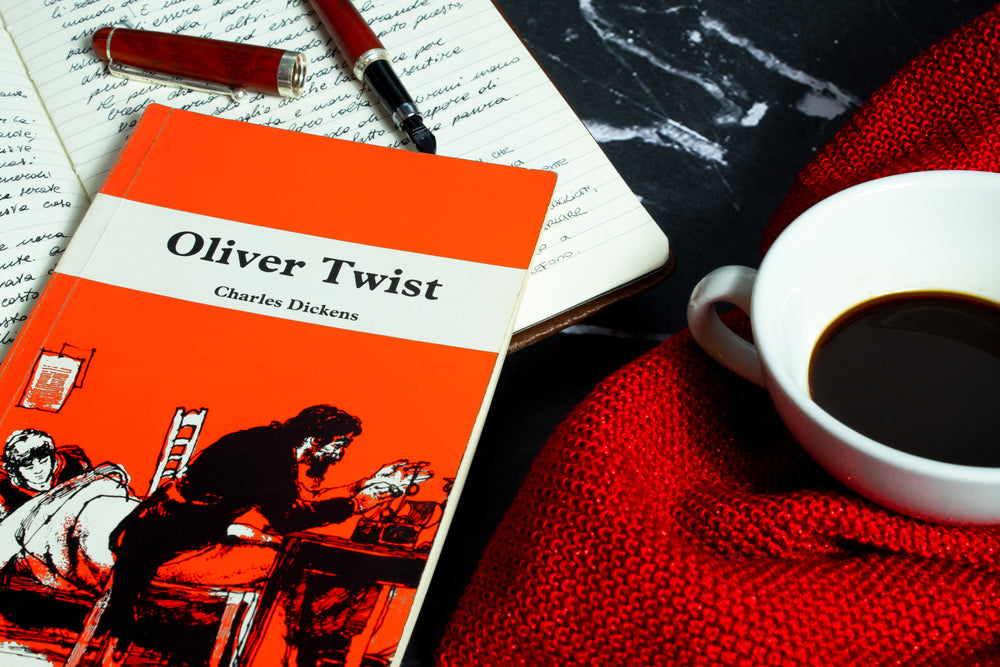Add description, images, menus and links to your mega menu
A column with no settings can be used as a spacer
Link to your collections, sales and even external links
Add up to five columns
Add description, images, menus and links to your mega menu
A column with no settings can be used as a spacer
Link to your collections, sales and even external links
Add up to five columns

Dickens on Coffee and Tea
February 15, 2018 3 min read
Dickens on Coffee and Tea
Dickens Characters Choice of Coffee or Tea
In Dinner with Dickens by British food historian Pen Vogler, offers a whimsical but rather interesting theory about the Victorian author's various characters' moral fiber based on their preference for tea. According to her, the good guys prefer tea while the dodgier ones plot and scheme over coffee.
Dickens Shares Tea as a Comfortable Ritual
Tea is often (though not always) part of a comfortable and feminine ritual; coffee-drinking was seen as more vigorous and powerful, thanks perhaps to its caffeine boost, but also to its association with the 19th-century coffee houses where men gathered to talk politics."
Dickens Shares Coffee as a Notoriety
Perhaps the most notorious coffee drinker Dickens created is the fraudulent "telescopic philanthropist" Mrs. Jellyby from Bleak House who spends all her time drinking strong espresso coffee, neglecting her feminine role as mother and wife, while she writes coffee fueled letters long into the night, to promote a possibly coffee-growing charity," says Vogler.
Coffee also brings to mind the cloying and sinister passage from David Copperfield featuring the smarmy Uriah Heep. "It's a brilliantly excruciating scene," says Vogler. "David invites Uriah Heep for coffee, intending a rather manly encounter, which Uriah Heep infuriatingly and skillfully subverts at every turn. His boastful glee that David is serving him turns David's hospitable gesture into something servile and emasculating.
A Tale of Two Cities and Coffee
In A Tale of Two Cities, set amidst the bloodletting of the French Revolution, Vogler points to the "chilling scene in which the Marquis genteelly sips an espresso while he is having a conversation, toxic with veiled threats, with his nephew." With his "face of a transparent paleness" and "very slightly pinched" nostrils, the Marquis is a study in sadistic cruelty.
Lower down in the caffeinated rogues' gallery is the shameless sponge and lay about Harold Skimpole, also from Bleak House, who is perfectly content with the best things in life as long as someone else is paying for them. As he airily declares, "Give me my peach, my cup of coffee, and my claret; I am content."
As for the warm-hearted and virtuous tea drinkers, what more affecting example than the scene from The Old Curiosity Shop, where the starved and ill-treated little maidservant called the Marchioness — one of Dickens' most sentimental portraits — nurses the good-natured Dick Swiveller back from the brink. "She kisses his hands and administers hot tea, and toast to him for breakfast.
Equally beloved is Pip's rustic blacksmith brother-in-law, Joe Gargery, from Great Expectations. "As truly humble and good as Uriah Heep is not, Joe is a natural tea drinker," says Vogler.
On balance, most of Dickens' characters drink hot tea. It is a regular and welcome punctuation for their daily lives, which suggests that it was also Dickens’ preference too. "After tea taxation was slashed in 1784, tea consumption soared and it rapidly became a prop for all classes. For Dickens' working-class characters, hot tea is a 'warm and greasy', a comfortable meal, whereas coffee had suggestions of refinement and cruelty."
So the next time you look forward to enjoying a cup of a rich, dark Espresso Blend or a French Roast Coffee or maybe you prefer a lovely cup of a classic Earl Grey, or the Mystic Dragon White Tea or the exotic Jade Pearl Jasmine Tea, consider gentle reader, what is your beverage choice saying about you?
Source: Nina Martyris reviews Dinner with Dickens, by Pen Volger in The Salt for NPR Books.
Subscribe
Sign up to get the latest on sales, new releases and more …
